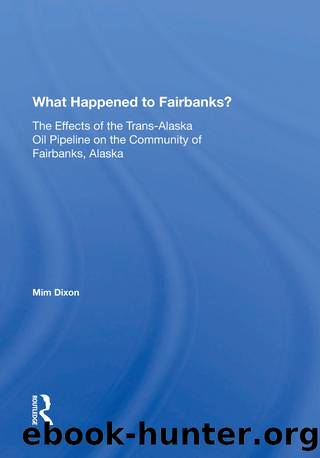What Happened To Fairbanks? by Mim Dixon

Author:Mim Dixon [Dixon, Mim]
Language: eng
Format: epub
Tags: Social Science, General, Sociology
ISBN: 9781000010763
Google: 35SwDwAAQBAJ
Barnesnoble:
Goodreads: 50738752
Publisher: Routledge
Published: 2019-06-17T00:00:00+00:00
Chapter 10
Teenagers Take over in Fairbanks
Fresh face. Eager smile. Hair pulled back with a bright silk scarf. You couldn't help but notice the youthfulness of the person handing back your change at the cosmetic counter of the drugstore, the sportswear section of the department store, the check-out line at the grocery store, or the teller's window at the bank. She couldn't be more than 19, you think. She was probably closer to 16.
While high school students in the "Lower 48" states were babysitting, mowing lawns and finding other odd jobs to earn their weekly spending money, the teenagers of Fairbanks were accumulating substantial savings accounts as they kept the town going by taking jobs vacated by persons working on the pipeline. Young people could be seen holding responsible jobs in nearly every local establishment. They worked as bookkeepers, stock persons, secretaries and clerks. They pumped gas, repaired vehicles, cooked and waited tables. And, they did a variety of more menial jobs--boxboy, dishwasher, maid.
Fairbanks Memorial Hospital is located just behind the high school, an easy commute for the 30 to 40 high school students who worked part-time jobs that had been filled fulltime by adults. The teenagers earned $4.10 per hour working in housekeeping, the kitchen, and the office of the hospital. Three high school students had enviable positions working in surgery.
High school students in Fairbanks received a mixed blessing with the pipeline. Their lives were disrupted considerably when the school board decided that the only way to prepare for the anticipated population influx was to use the high school facility in two shifts. Two separate high schools were created, each with its own administration, faculty, staff, and student body. But, they used the same building. One school met from 7:00 a.m. to 12:03 p.m.; the other school held classes from 1:00 p.m. until 6:00 p.m. Many of the traditional after school activities had to be curtailed. The unconventional school hours often created logistical problems for families. Many of the young people objected to a schedule in which they turned off the alarm clock at 5:00 a.m., could barely keep their eyes open during their first period class, and ate lunch early in the morning.
Not unlike other small towns, Fairbanks teenagers had always complained that "there's nothing to do." There weren't many organized activities for teenagers in Fairbanks; furthermore, teenagers didn't seem to like organized activities. Traditional teenage gathering places--MacDonalds, the Dairy Queen, the drive-in root beer stand--got boring after a while. During the pipeline period the boredom and frustration of being a teenager in a small town seemed to disappear. By going to school only half-day, teenagers found that they could take many of the jobs vacated for pipeline work. Unlike adults who could not afford to live in Fairbanks on the wages of the low-paying local jobs, teenagers who were already supported by their parents found those jobs attractive. The jobs provided a challenge, a learning experience, a source of income, and an adult role in the community.
In a
Download
This site does not store any files on its server. We only index and link to content provided by other sites. Please contact the content providers to delete copyright contents if any and email us, we'll remove relevant links or contents immediately.
The European Opportunity by Felipe Fernández-Armesto(589)
The European History Highway: A Guide to Internet Resources by Dennis A. Trinkle Scott A. Merriman(546)
Morgan Kaufmann Digital Watermarking and Steganography by Ingemar Cox Matthew Miller Jeffrey Bloom Jessica Fridrich Ton(541)
The Seven Wonders of the Ancient World by Michael Denis Higgins(534)
Hyperculture by Byung-Chul Han(527)
European Security without the Soviet Union by Stuart Croft Phil Williams(516)
The Routledge companion to Christian ethics by D. Stephen Long Rebekah L. Miles(513)
European Security in a Global Context by Thierry Tardy(511)
Get Real with Storytime by Julie Dietzel-Glair & Marianne Crandall Follis(457)
Hudud Al-'Alam 'The Regions of the World' - a Persian Geography 372 A.H. (982 AD) by V. V. Minorsky & C. E. Bosworth(450)
Tibetan Studies in Comparative Perspective by Chih-yu Shih Yu-Wen Chen(443)
Gorbachev And His Generals by William C. Green(434)
Governance, Growth and Global Leadership by Espen Moe(430)
CliffsNotes on Fitzgerald's The Great Gatsby by Kate Maurer(419)
How Languages Are Learned 5th Edition by Patsy M Lightbown;Nina Spada; & Nina Spada(414)
The Oxford History of the World by Fernández-Armesto Felipe;(400)
The Egyptian Economy, 1952-2000 by Khalid Ikram(391)
The Oxford Handbook of the Incas by Sonia Alconini(379)
Oral Poetry and Narratives from Central Arabia: The Poetry of Ad-Dindan : A Bedouin Bard in Southern Najd (Studies in Arabic Literature, Vol 17) (English and Arabic Edition) by P. M. Kupershoek P. Marcel Kurpershoek(371)
